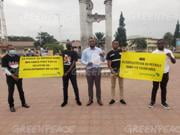More than 100,000 people have signed a petition calling on President Félix Tshisekedi of the Democratic Republic of Congo (DRC) to end the development of new oil and gas fields in the country. The petition was launched earlier this month by Congolese and international NGOs and was handed over by Greenpeace Africa activists to the DRC Presidency.
The petition, distributed offline and online across the DRC by three national environmental NGOs and to international audiences through 350.org, Greenpeace Africa, Rainforest Foundation UK, and Rainforest Rescue, warns that the DRC government in Kinshasa is nearing a point of no return: the government wants to sacrifice vast areas of Congo rainforest and peatland for oil. This would be an unmitigated disaster for the climate, biodiversity and local people.
“Nothing can justify this environmental crime. Look for money elsewhere and don’t pollute our planet,” said Isaac Mumbere of the Réseau CREF RDC.
Bonaventure Bondo, Coordinator of the Youth Movement for the Protection of the Environment MJPE-RDC, said, “The time for promoting new oil projects is over. For our well-being and that of future generations, we say NO to the selling off of our forests and peatlands and ask President Félix Tshisekedi to order the immediate stop of auctioning of oil blocks in our sensitive ecosystems such as the Virunga National Park and other parts of the Congo basin.”
“With the auction of oil blocks, local communities are taken hostage by politico-economic elites. Congolese oil will mean the disappearance of immense parts of the biodiversity which 100 million people depend on for fishing, agriculture and other traditional practices. It also means the ongoing neglect of alternatives to renewable energies. We say no to this sale,” said Justin Mutabesha of the Association des Jeunes Visionnaires RDC.
“The DRC lacks no resources to boost its economy and improve the living conditions of Congolese people. The country is ranked 182 in good governance, while its population lives on less than $1 a day even in the town of Walikale, where cobalt is mined,” said Faustin Nyebone from AICED (Support for Community Initiatives for Environmental Conservation and Sustainable Development).
“Only six months after signing a $500 million forest protection deal at the COP26, the Congolese government is declaring war against our planet with oil and gas. The immediate price will be paid by Congolese communities, who are not aware of the auction, have not been consulted or informed of the risks to their health and livelihoods. Many of them will rise up against it – and we shall stand with them,” said Irene Wabiwa Betoko, International Project Leader for the Congo Basin forest, Greenpeace Africa.
“This chaotic sell-off of some of DRC’s most sensitive forests undermines its image as a ‘solutions country’ to the climate and biodiversity crises. While DRC’s development needs are very real, there is little to suggest that oil and gas revenues would be used for the public good rather than the personal enrichment of political elites. Instead, we urge the government and its international partners to keep fossil fuels in the ground and trees standing by working with local and indigenous communities who depend on these areas,” said Joe Eisen, Executive Director of Rainforest Foundation UK.
“The plans are shocking. As the world is facing a mass extinction of animal and plant species and a climate emergency, DRC’s government is about to trigger an environmental bomb that also threatens the livelihood of millions of people who depend on Congo’s forests. The oil must be kept in the ground around the world, including in DRC”, says Marianne Klute, chairwoman of Rettet den Regenwald / Rainforest Rescue.
“The plan to auction 27 oil blocks and 3 gas blocks in DRC is a move to condemn the country and its rich biodiversity to destruction. There’s so much at stake for people’s jobs and health, not to mention the impacts of the climate crisis and human rights abuses that these fossil fuel projects will cause. Instead, this is a historic chance for the nation’s leadership to signal their commitment to driving real transformative change by keeping fossil fuels in the ground, rather than locking the nation out of a just transition. There’s huge potential for DRC to grow economically through clean renewable energy,” said Charity Migwi, Africa Regional Campaigner at 350.org

